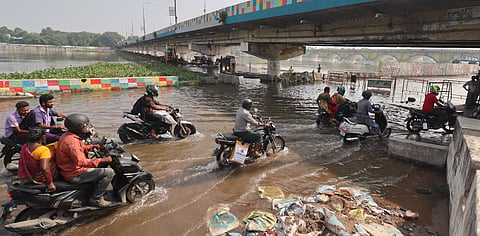

MADURAI: Recent research by the Madurai Nature Cultural Foundation has revealed a dire situation: the Vaigai, a vital water source and cultural symbol, is heavily polluted and unfit for human consumption. The study, conducted from August 28 to September 6 along the entire length of the river, paints a grim picture of the river's health.
Water samples collected at 36 different points showed alarming levels of contamination. Eight samples were classified as 'D' category, indicating pollution from pesticide runoff. Even more concerning, 28 samples fell into the 'E' category, the lowest water quality classification.
"The decline in stork populations is a particularly worrying sign," Tamilthasan, the foundation's coordinator, explained to TNIE. "Storks are highly sensitive to water quality, and their dwindling numbers are a clear indication of the river's deteriorating health."
Adding to the concern is the rise in populations of birds that thrive in polluted environments, such as coots and glassy ibis. "These birds are drawn to the river due to the high levels of sewage contamination," Tamilthasan noted.
The foundation's research, conducted by ornithologist N Raveendran, botanist N Karthikeyan, and environmental enthusiasts GR Viswanath and M Tamilthasan, also revealed a concerning spread of invasive plants, such as hyacinth and various types of grasses, which choke the waterway and contribute to the decline in water quality. The team examined the relationship between people and the Vaigai, and the impact of urbanisation and pollution on the river.
A PWD official, speaking on condition of anonymity, acknowledged the pollution problem. "The water quality is generally good in the upper reaches of the river," the official admitted. "However, human activities contaminate the water as it flows downstream."
The Foundation has submitted its report to Chief Minister MK Stalin and District Collector MS Sangeetha, urging them to take immediate action to protect and restore the Vaigai River.
Central Pollution Control Board (CPCB) categories
* A Class Water: Used for drinking after disinfection (chlorination) but without treatment
* B Class Water: Used for outdoor bathing
* C Class Water: Used for drinking after conventional treatment
* D Class Water: Used for the propagation of wildlife and fisheries.
* E Class Water: Used for irrigation, industrial cooling, and controlled disposal.
Rare species of smooth-coated otter found
In their research report, they said that a rare species of Lutrogale perspicillata (smooth-coated otter) was found in the dense forest area of the Vaigai's origin. A similar species is found in the Kaveri River pathway area. The International Union for Conservation of Nature (IUCN) has declared Lutrogale perspicillata vulnerable. Members recommended that the authorities take necessary efforts to increase their numbers and protect their living zones. Apart from the smooth-coated otter, 35 mammal species, including deer and mongoose, were recorded. Similarly, 67 types of plant species were documented by the team.
175 bird species identified
The report also spoke about the 175 bird species documented, of which 12 are on the red list. It also identifies the points where sewage enters the river in the districts of Theni, Ramanathapuram, Madurai, and Sivaganga.